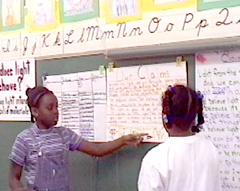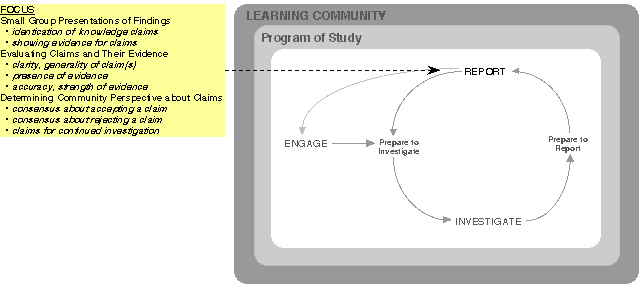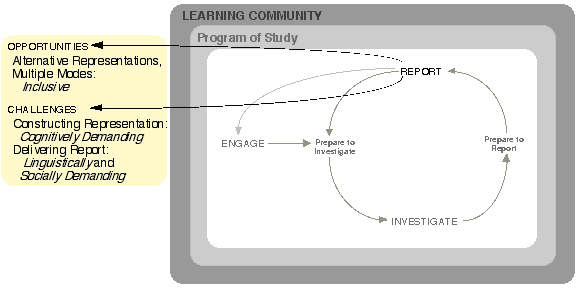

|
About GIsML Instruction |
|
The GIsML Project > Heuristic > Phases of Instruction > Reporting
Phases of Instruction
Reporting.
 A
hallmark of GIsML instruction is the part of the inquiry process in which
students' findings are publicly shared and discussed. This generally consists
of having groups of students who have been investigating together publicly
describe and discuss their findings in front of the whole class. In addition
to providing occasions for discussing important issues related to the
investigative process (e.g., possible errors, missed observations), public
reports require students to make and defend statements about their understandings,
and provide occasions for examining one's thinking and sense-making (Brown
& Campione, 1993; Palincsar, Anderson, & David, 1993). In addition,
when students publicly share their results, the need for vocabulary and
a common language to communicate ideas becomes salient. Thus, there is
an important opportunity for the teacher to support and guide students
in the use of appropriate scientific terms to facilitate their communication.
A
hallmark of GIsML instruction is the part of the inquiry process in which
students' findings are publicly shared and discussed. This generally consists
of having groups of students who have been investigating together publicly
describe and discuss their findings in front of the whole class. In addition
to providing occasions for discussing important issues related to the
investigative process (e.g., possible errors, missed observations), public
reports require students to make and defend statements about their understandings,
and provide occasions for examining one's thinking and sense-making (Brown
& Campione, 1993; Palincsar, Anderson, & David, 1993). In addition,
when students publicly share their results, the need for vocabulary and
a common language to communicate ideas becomes salient. Thus, there is
an important opportunity for the teacher to support and guide students
in the use of appropriate scientific terms to facilitate their communication.
The development of understanding from the other phases of GIsML instruction stems partly from participation in this, the Reporting phase, due to its public nature and the opportunities it provides to promote student development of shared values and activities with respect to knowledge building. When students experience multiple cycles of investigation and publicly observe and discuss the knowledge that the class/community is building, it conveys the message that it is important to examine one's thinking and understanding and that it can change and evolve over time.


Phases of Investigation: Engaging | Investigating | Reporting | Constructing & Evaluating
Heuristic home | Learning Community | Conceptual Terrain | Cycles of Investigation | Types of Investigation